Related Research Articles

Maasai Mara, also sometimes spelt Masai Mara and locally known simply as The Mara, is a large national game reserve in Narok, Kenya, contiguous with the Serengeti National Park in Tanzania. It is named in honour of the Maasai people, the ancestral inhabitants of the area, who migrated to the area from the Nile Basin. Their description of the area when looked at from afar: "Mara" means "spotted" in the local Maasai language, because of the short bushy trees which dot the landscape.

The Maasai are a Nilotic ethnic group inhabiting northern, central and southern Kenya and northern Tanzania, near the African Great Lakes region. Their native language is the Maasai language, a Nilotic language related to Dinka, Kalenjin and Nuer. Except for some elders living in rural areas, most Maasai people speak the official languages of Kenya and Tanzania—Swahili and English.
Vusimuzi "Vusi" Sibanda is a Zimbabwean cricketer. He has played international cricket for the Zimbabwe in all three formats of the game. He also played for Midlands in the Logan Cup.
Mluleki Luke Nkala is a Zimbabwean international cricketer. He took the wicket of Sachin Tendulkar with his second ball in senior international cricket in 1999. He also took five wickets against England in a test match in Nottingham in 2000.

Ashwell Gavin Prince is a former South African cricketer and captain who played all formats of the game for South Africa. At the age of 29, he became the first non-white man to captain the South African cricket team when he stood in for the injured Graeme Smith in two Tests. He took on the role of batting consultant with the Bangladesh cricket team in mid-2021 but resigned in early 2022. He is currently a guest commentator with ABC Grandstand for the Australia-South Africa Test series in Australia.

Abraham Benjamin de Villiers is a South African former international cricketer, and a current commentator. AB de Villiers was named as the ICC ODI Player of the Year three times during his 15-year international career and was one of the five Wisden cricketers of the decade at the end of 2019. He is regarded as one of the greatest cricketers in the history of the sport and the best batsman of his era, dominating the Number 1 ranking for batsmen in tests & ODIs more than any other batsman of his era. De Villiers began his international career as a wicket-keeper-batsman, but he has played most often solely as a batsman. He batted at various positions in the batting order, but predominantly in the middle-order.
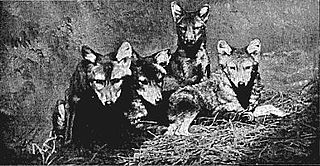
Roosevelt in Africa is a film by Cherry Kearton, released in 1910. It is a documentary about the Smithsonian–Roosevelt African Expedition, featuring Theodore Roosevelt in Africa. It is shot in silent black and white.

Richard Ernst Levi is an English-South African cricketer. He played in the 2006 U-19 Cricket World Cup in Sri Lanka. He currently plays for Western Province, Cape Cobras and Northamptonshire. He attended Wynberg Boys' High school in Cape Town and received honours for cricket in 2005.
Alex Auma Obanda is a Kenyan cricketer who has played first-class cricket for Kenya Select.
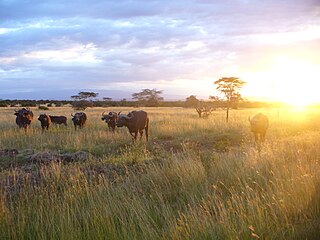
The wildlife of Kenya refers to its fauna. The diversity of Kenya's wildlife has garnered international fame, especially for its populations of large mammals. Mammal species include lion, cheetah hippopotamus, African buffalo, wildebeest (Connochaetes), African bush elephant, zebra (Equus), giraffe (Giraffa), and rhinoceros. Kenya has a very diverse population of birds, including flamingo and common ostrich.
Temba Bavuma is a South African international cricketer who is the current captain of the South African cricket team in Tests and ODI cricket, and formerly captained in T20I. He is now predominantly a right-handed opening batsman. He was the first black African cricketer to make a Test century for South Africa and the first to captain the side. Bavuma is one of three South African cricketers to score a century on ODI debut, scoring 113 runs against Ireland in September 2016.
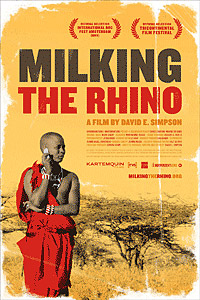
Milking the Rhino is a 2009 documentary film, produced by Kartemquin Films, that examines the relationship between the indigenous African wildlife, the villagers who live amongst this wildlife and conservationists who look to keep tourism dollars coming in. Both the Maasai of Kenya and the Ovahimba of Namibia have spent centuries as cattle farmers. With their lands being turned into protected game reserves, these ancient tribes have turned to tourism as a means of survival.
The 2012–13 international cricket season was from September 2012 to March 2013. It began with the ICC World Twenty20, which the West Indies won by defeating host nation Sri Lanka in the final. As a result, Sri Lanka and the West Indies rose to number one and two respectively in the ICC T20I Championship rankings. The season included the first bilateral series between India and Pakistan since 2007. Bilateral ties between the two countries had been severed since the 2008 Mumbai attacks.
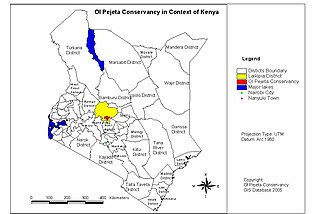
The Ol Pejeta Conservancy is a 360 km2 (140 sq mi) not-for-profit wildlife conservancy in Central Kenya's Laikipia County. It is situated on the equator west of Nanyuki, between the foothills of the Aberdares and Mount Kenya. The Ol Pejeta Conservancy works to conserve wildlife, provide a sanctuary for great apes, and generate income through wildlife tourism and complementary enterprises for re-investment in conservation and community development.
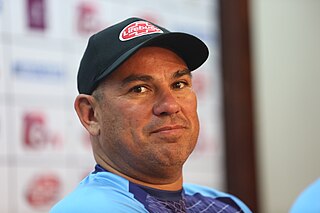
Russell Craig Domingo is a South African cricket coach. He coached the South Africa national cricket team from 2012 to 2017 and the Bangladesh national cricket team from 2019 to 2022.
Malibongwe "Mali" Maketa is a former South African cricketer who represented Border in South African domestic cricket. He is the current interim head coach for South Africa's upcoming three-match Test tour of Australia, which begins on December 17, 2022. After stints as head assistant coach of the South African men's national team and heading up the SA 'A' setup and the national academy.
The Big Life Foundation is a non-profit conservation organization created to preserve the wildlife and habitats of the Amboseli-Tsavo-Kilimanjaro ecosystem of East Africa through community-based and collaborative strategies.
The Iloikop wars were a series of wars between the Maasai and a community referred to as Kwavi and later between Maasai and alliance of reformed Kwavi communities. These were pastoral communities that occupied large tracts of East Africa's savannas during the late 18th and 19th centuries. These wars occurred between c.1830 and 1880.
The Laikipiak people were a community that inhabited the plateau located on the eastern escarpment of the Rift Valley in Kenya that today bears their name. They are said to have arisen from the scattering of the Kwavi by the Maasai in the 1830s.They were one of two significant sections of that community that stayed together. The other being the Uasin Gishu with whom they would later ally against the Maasai. Many Maa-speakers in Laikipia County today claim Laikipiak ancestry, namely those among the Ilng'wesi, Ildigirri and Ilmumonyot sub-sections of the Laikipia Maasai.

Adumu, also known as the Maasai jumping dance, is a type of dance that the Maasai people of Kenya and Tanzania practice. Young Maasai warriors generally perform the energetic and acrobatic dance at ceremonial occasions including weddings, religious rites, and other significant cultural events.
References
- 1 2 3 "Cricket Team Of Maasai Warriors Goes To Bat For Women's Rights". HuffPost. 2016-01-29. Retrieved 2021-11-27.
- ↑ "Kenyan Maasai warriors swap spears for cricket bats". DAWN.COM. 2012-03-17. Retrieved 2021-11-29.
- ↑ "Maasai warriors take to the cricket field to save the northern white rhino - 10.08.2015". DW.COM. Retrieved 2021-11-28.
- ↑ "The Maasai Cricket Warriors". theatlantic.com. Retrieved 2021-11-27.
- 1 2 Moonda, Firdose (2012-02-02). "Firdose Moonda on the Maasai Cricket Warriors of Kenya". ESPNcricinfo. Retrieved 2021-11-27.
- ↑ Sportstar, Team (2017-06-19). "Maasai Cricket Warriors: On a mission to save the rhinos". Sportstar. Retrieved 2021-11-27.
- ↑ "Kenya's Maasai cricketers in row over attire". BBC News. 2012-03-22. Retrieved 2021-11-27.
- ↑ "Maasai cricketers, England's top bowler unite against HIV, FGM". Africa – Gulf News. 2015-07-15. Retrieved 2021-11-28.
- ↑ InpaperMagazine, From (2016-01-10). "From warriors to cricketers". DAWN.COM. Retrieved 2021-11-28.
- ↑ "The Real Goal For These Cricket-Crazy Maasai Men? Ending 'The Cut'". NPR.org. 2016-01-21. Retrieved 2021-11-27.